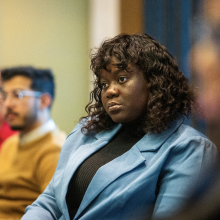Since its inception, the RBM Partnership to End Malaria has worked at the intersection of health and sustainable development, in recognition of the fact that malaria is a disease that thrives in and results in poverty. Through its Strategic Plan 2018-2020, the Partnership seeks to promote developmental strategies that aspire to eradicate poverty to take the fight against malaria as part of their core missions. This can only be achieved through a multi-sectoral approach.
The structure of the RBM Partnership to End Malaria at global, regional, national and sub-national levels needs to reflect the multisectoral nature of the fight against malaria. In 2013, the RBM Partnership and the United Nations Development Programme (UNDP) developed a Multisectoral Action Framework for Malaria, which made a compelling case for rethinking the way countries address malaria.
A multisectoral approach to malaria means that a wide range of stakeholders is engaged and the aims of malaria control and elimination are met by joint efforts. The RBM Partnership Strategic Plan 2018-2020identifies key sectors such as education, extractive industries, housing, agriculture, environment, tourism and transport sectors as the trailblazers for robust engagement at all levels.
This year, we are working on building on these foundations to transform RBM into a truly multi-sectoral Partnership. As a first step, we are planning to develop and rollout a tool to help countries appraise the extent to which malaria has been integrated multisectorally and to develop action plans for increasing malaria-smart investments across priority sectors. This process will help countries identify concrete implementable actions that would transform the response to malaria- from being a concern of the health sector only, towards a coordinated multi-pronged effort that harnesses expertise across a range of sectors and institutions.
Some of our Partners have also put forward a proposal for accreditation of a new RBM multi sectoral malaria working group which the RBM Partnership Board will consider at its 9th meeting on 13-14 April. If approved, the Multi-Sectoral Working Group will bring together different stakeholders across different sectors including health, science and technology, international cooperation, infrastructure, water and sanitation, environment, food and agriculture, education, security, finance, trade, social protection and justice. The aim is to align partners in their actions for faster uptake and scale up of multi-sectoral collaboration and strategies.
On 18 April 2018, the London Malaria Summit will bring together leaders from across all sectors to renew commitments to accelerate progress towards ending history’s deadliest killer. Co-hosted by the Governments of Swaziland and Rwanda, and convened by the RBM Partnership to End Malaria, Malaria No More UK and the Bill & Melinda Gates Foundation, the Malaria Summit will take place on the eve of the 2018 Commonwealth Heads of Government Meeting, taking advantage of this key opportunity to showcase national and international leadership on malaria from across the Commonwealth and beyond. Business leaders, philanthropists, scientists, Heads of States and civil society are convening to announce new commitments to beat malaria. Together, they will put up new resources, lend talent, money and knowledge, to reduce cases and deaths today while innovating for a malaria-free world in the future.
This month, we are also marking the 10th World Malaria Day on 25 April, with its theme of “ready to beat malaria”. As part of the celebrations, we are organising a roundtable in Geneva, together with the Swiss Malaria Group, which will explore how ending malaria will generate a ripple effect across the development spectrum.

Latest Blogs



